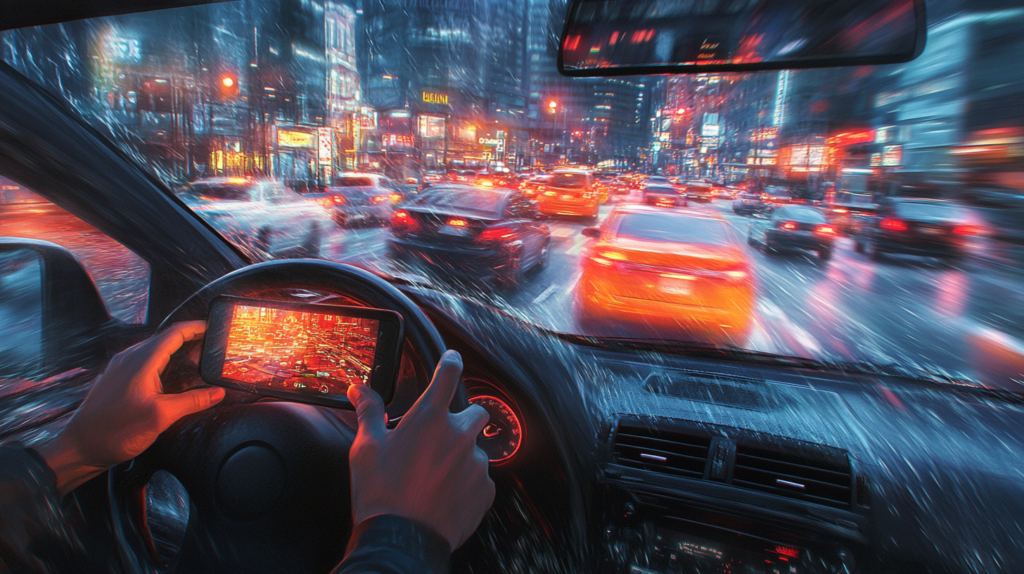What is Distracted Driving?
Distracted Driving is when a person operates a motor vehicle while engaging in activities that divert attention from driving tasks, such as:
- Talking on a cell phone
- Using a navigation system
- Texting or emailing
- Eating
- Adjusting hair or makeup
- Using the audio system
- Texting
According to the National Highway Traffic Safety Administration (NHTSA), “Distracted driving is any activity that…takes your attention away from the task of safe driving.” Studies have shown that texting while driving significantly increases the likelihood of a crash or near-crash event. The detrimental effects of distracted driving can range from minor fender-benders to severe accidents resulting in life-altering injuries or fatalities.
Understanding the risks associated with distracted driving and adopting safe driving practices can help mitigate its adverse impacts on road safety and overall public safety.
More information about Distracted Driving
Parents Urged to Keep Laundry Pods Away from Children
Once again, manufacturers of a product intended for use by adults have packaged a product in a way that appeals to children, leading to injury. We previously reported on Buckyballs, an adult stress-relieving toy that is made of small magnets, that appeals to young children who swallow the magnets, requiring surgery. Now, ABC News reports that children are mistaking the new single-dose laundry detergent packets, such as Tide Pods, for candy.
An 18-month-old child had to be rushed to the emergency room with severe nausea, vomiting and diarrhea after he swallowed a pod believing it to be candy. Five months later, according to ABC News, nearly 1,200 children have been treated for swallowing laundry detergent, and eleven of them are critically ill on ventilators. The new laundry packets were first introduced in February.
The American Association of Poison Control Centers (AAPCC) issued a warning on May 17 “urging the public, […]
Read MoreMore information about Distracted Driving
Pennsylvania Drivers Urged to Read DOT’s Blueprint for Ending Distracted Driving
Our Pennsylvania truck accident attorneys have continually stressed the dangers and the tragedy of distracted driving. Just last month we presented information about a young teen who is now serving jail time due to a distracted driving accident that resulted in the death of a 55-year-old man. For some, unfortunately, a serious jolt such as an accident is what it takes to wake them up to the dangers of distracted driving.
However, Transportation Secretary Ray LaHood, who has been steadfast in his battle to end distracted driving in the United States, hopes to end accidents caused by distracted drivers. Now, under his direction, the U.S. Department of Transportation (DOT) has launched its Blueprint for Ending Distracted Driving.
The blueprint, according to LaHood’s blog, Fast Lane, “is putting critical safety information into the hands of those who can make the biggest difference. Parents, teens, driving instructors, […]
Read MoreMore information about Distracted Driving
PA Car Accident Attorney Says Expected Increase in Fourth of July Car Travel Raises Need to Keep Safety in Mind
Scranton, PA, June 29, 2012 — Pennsylvania car accident lawyer Caroline Munley today urged the state’s residents to keep safety in mind as decreasing gas prices fuel an expected upsurge in drivers on the road this July 4th holiday.
“As more people hit the road to celebrate Independence Day and for early summer vacations, the increase in traffic congestion raises the need to be mindful of safe driving practices,” said Munley, managing partner of the Pennsylvania personal injury firm of Munley Law in Scranton.
“We urge travelers to refrain from fatigued driving, drinking and driving and distracted driving, such as using cell phones for talking or texting while driving, which are all major causes of car accidents,” she said.
The AAA auto club said it expects 42.3 million Americans to travel more than 50 miles from home over the Independence Day period, […]
Read MoreMore information about Distracted Driving
Pennsylvania Accident Victims Should Request a Copy of Their Vehicle Accident Report
Earlier this month our PA truck accident lawyers offered some information regarding vehicle accident investigations. However, we did not include information on the crash report and what happens with all the information that is compiled – and how you can access that information. Below we explain the importance of a Pennsylvania crash report.
The Pennsylvania State Police, along with the state’s nearly 1,300 local municipal police departments, have a duty to investigate each traffic accident that occurs on the Pennsylvania roadways. That is no easy task with over 120,000 miles of roads and highways in the state. According to the 2010 Pennsylvania Crash Facts and Statistics, in 2010, PA police investigated 121,312 traffic crashes. Of those accidents, 1,324 people died and 87,949 were injured.
When police come upon accidents the scene is often chaotic. The police must first make sure all of the accident victims are properly attended to and then they need to redirect traffic. […]
Read MoreMore information about Distracted Driving
Facebook and Twitter to be Offered as Features in New Cars
Earlier this year U.S. automakers unveiled their latest features, including improved airbags and seatbelts, focused on saving lives and preventing serious injury in automobile accidents. These features were applauded by safety advocates for helping to keep car occupants safe on America’s highways. However, as carmakers unveil their latest Internet-based features, safety advocates fear automakers are contributing to the distracted driving epidemic.
According to the New York Times, automakers are planning on offering high-tech features in some of their 2013 models allowing drivers to stay ‘wired’ while in the car, without accessing their smartphones. Some of the apps that will be offered by Mercedes-Benz, Acura, Honda, Lexus, and Subaru, among other automakers, include GPS, Pandora streaming music, movie ticket ordering and even restaurant reviews from Yelp. However the carmakers aren’t stopping there. Some of the dealers will be offering access to social media sites, such as Facebook and Twitter. […]
Read More









